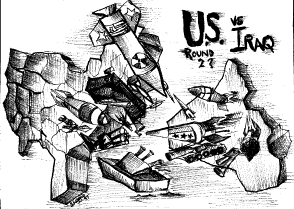![]()
![[ OPINIONS ]](/images/fall97/opinionsf97.gif)
![]()
By Jill Dellamalva
Arizona Daily Wildcat November 12, 1997
The conflict in Iraq: History in the making
![[Picture]](04_3_i.gif)
Jill Dellamalva |
"In 1492, Columbus sailed the ocean blue."
Students like myself use rhymes, flashcards or just about any other means to cram history facts into our heads. What was that date again? Who was the leader?
This is how I study history now. This is how I've been studying it since the fourth grade.
This is how I was taught.
But history is more than the 100 pages we read the night before the test. History is going on all around us all the time.
Here's a present example. MAIN CHARACTERS: Saddam Hussien and President Clinton, (although the government is trying to cast the U.N. as a main character, but I'll get to that later). LOCATION: Iraq. CONFLICT: Iraq won't back down on an order expelling U.S. members of U.N. weapons inspection teams, and it's threatening to shoot down U.N. surveillance planes. SOLUTION: Well, recent newspapers are reporting that the Clinton administration is considering a missile strike on Iraq if it carries out its threats.
According to the history books, these kind of conflicts have been going on for quite a while. Perhaps they should have ended when the Gulf War was over. But when General Norman Schwarzkopf was ordered not to continue into Baghdad after bringing troops about 125 miles in the sand without opposition, Saddam Hussien was given the chance to continue tormenting the United States.
Perhaps George Bush wanted Iraq to be a buffer against Iran. After all, during the Iran-Iraq War, which lasted 8 years, the United States sided with Iraq because the Ayatollah Khomeni posed a bigger threat than Iraq ever did. Now, through curious twists of international policy and intrigue, the United States is finding itself with Iraq as its number one tormentor.
But there I go doing what I was taught - reciting general facts, as if Iraq was one person by the name of Saddam Hussien and the United States was one person named President Clinton. Never mind the individual people of Iraq affected by the conflict. Never mind you and me.

I wonder what the Iraqi people would say if they were given the opportunity to write the history books. Somehow, I don't think they'd write about treaties, policies and politics. What they'd probably write about is everyday life and how such conflicts affect them personally. Do many of them even know what they're fighting for? Are they just as confused as many Americans are? The only thing that the U.S.'s bombing of Iraq would do is punish innocent Iraqi people.
And I wonder what the American, British, French and all the other soldiers who fought in the Gulf War would write in the history books. Dates would probably be the last things on their minds. More important would be the effects of Gulf War Syndrome that many of them developed upon returning home. No one is quite sure what causes it. There's an undercurrent of general suspicion that the U.S. government has information about it, and some people claim the government is hesitant to make it known because veterans' benefits will have to be paid. Perhaps it's like Agent Orange during Vietnam; it took a very long time before the U.S. government admitted it had a detrimental effect on soldiers lives.
But what do you think of when you hear about soldiers anyway? I see a group of bodies but no faces. I see the general, not the individual picture.
What would you write in the history books? Other than the fact that I think the present conflict in Iraq is America's problem and not the U.N.'s (because Iraq is targeting America, not any other U.N. countries), I would write about the serious Iraqi threat to the world. They're developing weapons of mass destruction including chemical weaponry that neither side knows how to protect itself from. This affects people. I would talk about the deaths during the Gulf War - the 148 Americans killed in action and 458 wounded and the 100,000 Iraqi soldiers who died and 300,000 who were wounded. And how about the U.S. ships and aircraft carriers that have been in the Persian Gulf since the Gulf War? Think about how much that costs U.S. citizens like my family and some of yours.
These are some examples of how history affects individuals. They're not generalized. They can't be memorized. If college students don't understand this, then how can a confused person with a machine gun understand? In the end, when that confused person ends up blowing up a whole town, the only thing we students will be able to take comfort in is being able to write the date it happened on the exam.
Jill Dellamalva is a junior majoring in creative writing and journalism.



